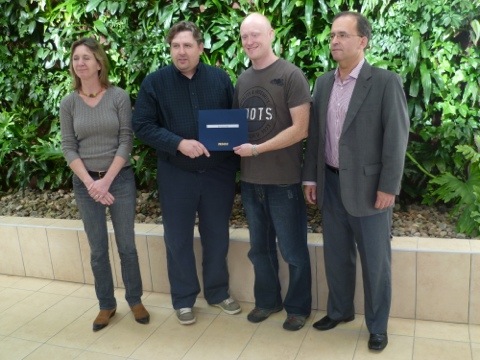Our energy efficiency reports were passed in yesterday and today were the presentations. The presentations were attended by lots of students, faculty, and community members. Some students from Holland College in PEI made the trip to Halifax to watch as well.
All groups did an excellent job of their projects and presentations. Because of the different nationalities and fields of study among the participants the strategies were quite different. Each group had at least one Irish student, one Dutch student, and one Canadian. I really enjoyed experiencing the different perspectives on things.
Our group did an energy model of a large (3000 square foot) house that was built in 2005. The home was R2000 and had an Energuide rating of 83. In order to develop our report we took the following steps:
- We collected utility data and normalized it using heating degree days. Linear regression and cumulative sum analysis was used to look for irregularities
- We developed an energy model of the house using HOT2000. This is free software from Natural Resources Canada that allows you to simulate the energy use in a house and find out where the areas for improvement are.
- A 3D model was built. The house drawings were supplied in AutoCAD and these were used to create a Google Sketchup model as well as a 3D rendering.
- An on-site audit was conducted and we collected data about various systems in the house and took inventory of items we felt were inefficient. We also used thermal imaging, sound meters, air quality sensors, and a blower door. We interviewed the home owner at this time to help us understand occupant behaviour.
We were able to come up with several opportunities for energy and efficiency. These were:
- Install energy efficient light bulbs in all fixtures.
- Retire the second refrigerator.
- Install a hot water tank insulating blanket.
- Use the programmable thermostat to set back heating at night.
- Install a real time energy monitoring system.
- Install a solar hot water heating system.
- Install a drain water heat recovery unit.
We also recommended the homeowner get a rain barrel to harvest rainwater for landscaping and to use mulch to increase water retention in the soil for his garden beds. All of our recommendations for the home would cut the energy consumption down by 42%. This would reduce greenhouse gas emissions by 8.18 tons, which is the same as planting 190 trees or taking 1.5 cars off the road. Being a part of this project was an amazing experience for me.
The international perspective was great and project based learning is a great way to learn. My field of study is quite new and I can expect to be working with people from other disciplines mostly, so the experience was priceless.
You can download a copy of our final report with recommendations
here.



